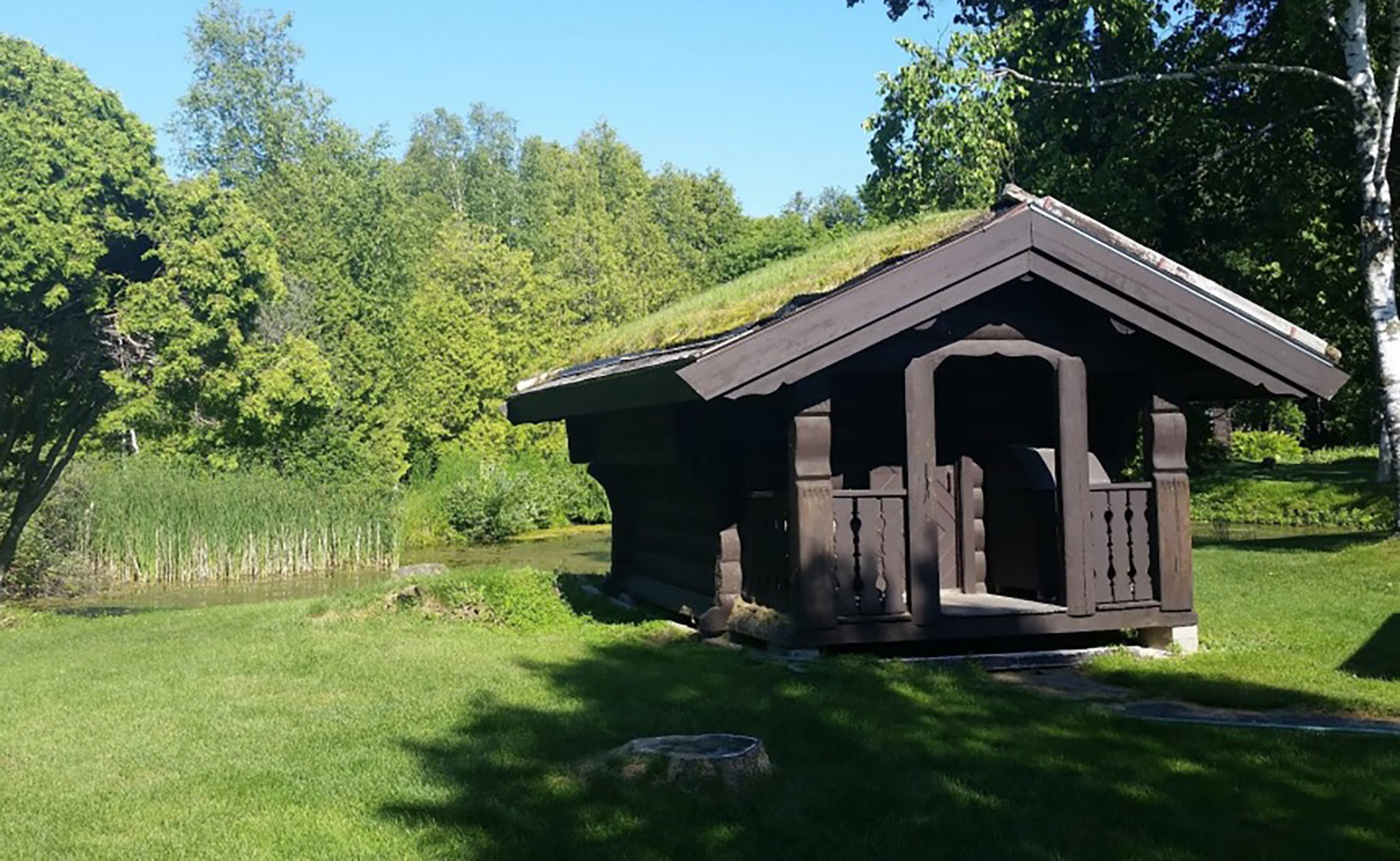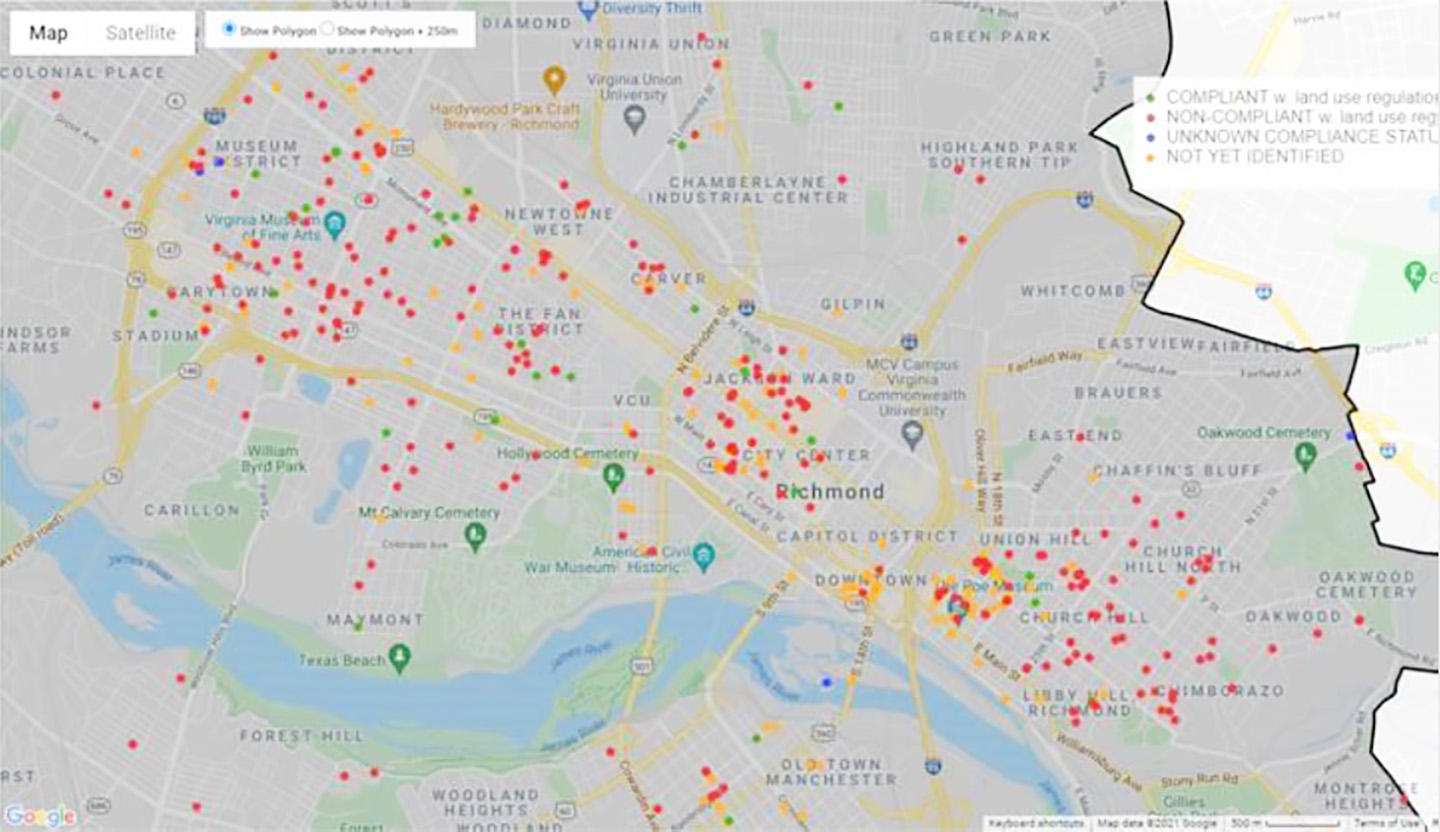
An example of an accessory dwelling unit, defined as a smaller attached or detached dwelling located on the same lot as a residence. (City of Richmond images)
City-initiated zoning changes relating to short-term home rentals, accessory dwelling units and minimum parking requirements are the focus of a series of community meetings that kick off tonight at Richmond’s Main Library.
The meetings are the first of two rounds of public engagement that city planners are undertaking to share and shape the zoning proposals and gather feedback. Formal proposals are to be shared in a second outreach round, tentatively scheduled for October.
Years in the works, the zoning changes follow up on recommendations included in the city’s master plan and requests from City Councilmembers. The changes related to short-term home rentals, or STRs, fulfill a process started in January aimed at revising Richmond’s rules for regulating the Airbnb-style rentals, most of which the city considers noncompliant and illegal.
In January, the Richmond Planning Commission approved a resolution of intent to amend the rules and revisit certain regulations, including a primary residency requirement in which operators must reside at the property being rented for at least half the year.
The commission had been slated to consider amendments to the rules last summer, having adopted them in mid-2020 with the caveat that they would be revisited after a year to review their effectiveness. COVID and staff changes within the planning department contributed to the process being delayed.
Accessory dwelling units, or ADUs, have been in discussion since late 2019, when the commission asked staff to study the appropriateness and feasibility of the smaller attached or detached dwellings that are located on the same lot as a residence.

A map of identified short-term home rentals in the city show the greatest concentrations in the Fan and Museum districts, Jackson and Monroe wards, Church Hill and Shockoe.
Also referred to as accessory apartments, secondary suites or “granny flats,” ADUs are viewed as allowing individuals to age in place, accommodating people with special needs, creating lower-priced housing and providing residents with rental opportunities to supplement income.
The city’s master plan, adopted in late 2020, recommends updating the city’s zoning ordinance to allow ADUs by-right with form-based requirements in all residential zones as a way to encourage more housing types across the city. The plan identifies ADUs as a primary use in areas of the city recommended for residential or neighborhood mixed-use.
The changes to parking requirements stem from a request from Councilmember Andreas Addison in mid-2020 that has gained support from some of his council colleagues.
Addison’s request sought a study to determine whether the zoning ordinance should be amended to eliminate or reduce parking space minimums and restrictions in areas zoned for commercial use and areas within the TOD-1 Transit Oriented Nodal District, which encourages development designed around public transit as opposed to more “auto-centric” approaches.
Eliminating parking minimums in those areas is also seen as facilitating development in urban cores where required parking could hinder investment and contradict density and walkability goals.
Tonight’s in-person meeting starts at 6 p.m. at the Main Library at 101 E. Franklin St. A virtual meeting is scheduled at noon Wednesday, and two telephone town halls – a new meeting format for the city that’s entirely phone-based – are scheduled at 6 p.m. Aug. 16 and noon Aug. 17.
Links to the virtual and phone meetings are available on the city’s website, where more information on the zoning changes also is posted.
Note: The above link to the city’s website was previously broken and has been fixed.

An example of an accessory dwelling unit, defined as a smaller attached or detached dwelling located on the same lot as a residence. (City of Richmond images)
City-initiated zoning changes relating to short-term home rentals, accessory dwelling units and minimum parking requirements are the focus of a series of community meetings that kick off tonight at Richmond’s Main Library.
The meetings are the first of two rounds of public engagement that city planners are undertaking to share and shape the zoning proposals and gather feedback. Formal proposals are to be shared in a second outreach round, tentatively scheduled for October.
Years in the works, the zoning changes follow up on recommendations included in the city’s master plan and requests from City Councilmembers. The changes related to short-term home rentals, or STRs, fulfill a process started in January aimed at revising Richmond’s rules for regulating the Airbnb-style rentals, most of which the city considers noncompliant and illegal.
In January, the Richmond Planning Commission approved a resolution of intent to amend the rules and revisit certain regulations, including a primary residency requirement in which operators must reside at the property being rented for at least half the year.
The commission had been slated to consider amendments to the rules last summer, having adopted them in mid-2020 with the caveat that they would be revisited after a year to review their effectiveness. COVID and staff changes within the planning department contributed to the process being delayed.
Accessory dwelling units, or ADUs, have been in discussion since late 2019, when the commission asked staff to study the appropriateness and feasibility of the smaller attached or detached dwellings that are located on the same lot as a residence.

A map of identified short-term home rentals in the city show the greatest concentrations in the Fan and Museum districts, Jackson and Monroe wards, Church Hill and Shockoe.
Also referred to as accessory apartments, secondary suites or “granny flats,” ADUs are viewed as allowing individuals to age in place, accommodating people with special needs, creating lower-priced housing and providing residents with rental opportunities to supplement income.
The city’s master plan, adopted in late 2020, recommends updating the city’s zoning ordinance to allow ADUs by-right with form-based requirements in all residential zones as a way to encourage more housing types across the city. The plan identifies ADUs as a primary use in areas of the city recommended for residential or neighborhood mixed-use.
The changes to parking requirements stem from a request from Councilmember Andreas Addison in mid-2020 that has gained support from some of his council colleagues.
Addison’s request sought a study to determine whether the zoning ordinance should be amended to eliminate or reduce parking space minimums and restrictions in areas zoned for commercial use and areas within the TOD-1 Transit Oriented Nodal District, which encourages development designed around public transit as opposed to more “auto-centric” approaches.
Eliminating parking minimums in those areas is also seen as facilitating development in urban cores where required parking could hinder investment and contradict density and walkability goals.
Tonight’s in-person meeting starts at 6 p.m. at the Main Library at 101 E. Franklin St. A virtual meeting is scheduled at noon Wednesday, and two telephone town halls – a new meeting format for the city that’s entirely phone-based – are scheduled at 6 p.m. Aug. 16 and noon Aug. 17.
Links to the virtual and phone meetings are available on the city’s website, where more information on the zoning changes also is posted.
Note: The above link to the city’s website was previously broken and has been fixed.
The link to the city’s website does not work, and the virtual meetings do not appear on the city’s website…no surprise here.
They do everything they can to avoid hearing from the public even before Covid. Most public meeting are more pronouncements or lectures with a few minutes at the end of comment.
https://www.rva.gov/planning-development-review/zoning-changes
Thanks, I scrolled through and was able to register for the phone meeting. Interesting idea, hope it works.
Richmond, and most growing cities, need more parking, not less. It’s good for business. Not every neighborhood has the density necessary to support a walkable economy.
There are a lot of places in the city were the surface is mostly paved parking lots and the land is going to waste.
I do support the idea of parking decks such as every apartment having one space such as in large mega builds. But I feel like most of the city along Board Street is one big paved wasteland.
As you get closer to Willow Lawn, there are a lot of lots, but downtown, every available square inch is getting developed. Our office building is in the TOD zone has 4 apartments above it and is within 1/2 a block of two large surface lots and a parking deck with a total of at least 300 spots. You’d think it would be easy to find a monthly parking spot right? NOPE. The two surface lots have been sold to developers who plan to put in 5-story apartment buildings. The YMCA has sold it’s three lots next door for the… Read more »
we should provide central paid parking garages as an amenity. But cities are not places where one should automatically assume one can park directly in front of the venue.
People have no problem walking 3 blocks from their spot in short pump mall to a store, but somehow that same 3 blocks in the city is too far.
we have plenty of parking. Cities are not about parking, they are about people
While the AirBNB trend has been great for travelers it has been horrible for affordable housing. Houses in many areas have been snatched up by investors using them only for short term rentals. This not only drives up the price for homebuyers, but lowers the amount of inventory that is out there for purchase, which further drives up the prices. Almost all those dots represent a lost unit of housing.
Got one of those in my neighborhood. Not only did it take a house of the market for owner/renter residents and drive up artificial sales prices with a full time airBnB but it has mainly hosted parties and the new owner put in an illegal basement apartment but hey lets make it easier for the investor owners that break the existing laws.
SDU’s are needed, more Air BNB party houses are not needed. I guess the hotel lobby has run out of gas after covid?
Did you mean ADU instead of SDU? Accessory dwelling units would help because they are traditionally smaller and less expensive than market rate apartments. Plus they would likely be in areas with little other affordable housing.
I’m not sure “horrible” is the right word. The added demand does have an impact, but Richmond has a few hundred (300ish) short-term rentals (many in apartment buildings, others that are a part of someone’s home, neither for sale). And Air B&Bs tend not to be terribly “affordable” areas.
Added demand does drive up pricing in housing, as it does in other areas of the economy. We don’t fret about restaurants driving up the cost of groceries for example.
The restaurant/grocery example is not really similar. That is more comparable to hotels and housing. Affordable housing is not only home ownership but rents as well. When you pull apartments out of the market for short term rentals you are messing with that segment of the affordable housing market. Yes, Richmond is a smaller market, but this not necessarily a Richmond only issue. It is a larger issue and some markets are affected much more than Richmond.